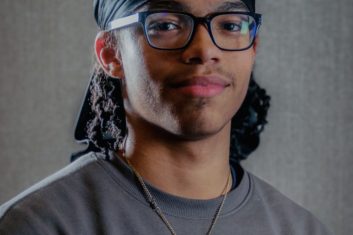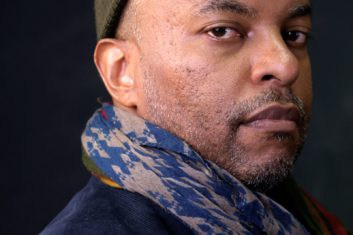Every accomplishment begins with a dream. If you could do anything, what would it be? For those lucky enough to have had the privileges of a good education, defining and pursuing dreams is a familiar exercise with varying degrees of success. For those with more limited educational exposure, it is a journey of immeasurable importance.
Sadly, both audiences are capable of greatness, regardless of opportunity. As Malcolm Gladwell points out in David & Goliath, “the reason underdogs win as often as they do is that the latter is sometimes every bit the equal of the former.” Tools, as simple as a slingshot, may be the difference between enabling students from less fortunate schools prevail.
I recently had the privilege of helping children from P.S./M.S. 279 in the Bronx edit their dreams, as expressed in poetry. Community-Word Project, through the generous support of Linklaters, publishes a poem from each child who participates in the program during the school year. An anthology is printed from each school, enabling the children to document, share their ideas and become published authors. It is a crystallization of their growth through the year in learning to think, form opinions, build confidence and articulate their thoughts and dreams.
I found the library alive with students excited to see the nine adults assembled before laptops to meet individually with them for twenty minutes. The children entered the work area tentatively and were assigned to different adults, like me, waiting to undertake the task.
I helped six children from grades 5-7 during 4-1/2 hours that passed all too quickly. Each child had a different voice and preferences varied from sports to science to social studies. Each session, however, was also quite similar.
Each child approached shyly and left reluctantly. It had been such a luxury to have 1:1 attention for this important task. They felt safe to express their thoughts, their memories and their dreams.
They smiled and chose their words carefully, arranging adjectives, now transferred from pencil to digital. They listened closely, admiring their work as I read it back to them, ensuring that the rhythm, line breaks and imagery conformed with their highest standard. We debated their poetry as adults, as critics, as dreamers.
These poems addressed ambitious premises:
5th and 6th Grade: Dear Future Me
6th Grade: The Beonx Dime Bank Broken Clocktower
7th Grade: My Moment of Bliss/Despair.
Their voices were soft, yet confident, building within the twenty minutes as surely they had grown over the course of the year. I, a sort of mentor, formed a tiny link in a chain that is often broken, but with compassion and support, can be repaired. I felt the humility of children, so grateful to have been given language and tools to describe their experiences, to have confidence to interpret their meaning and to smile, hopeful that this milestone marked only one of many accomplishments on the road ahead.
Fellow editors, during lunch, shared work experiences and entertained questions about career paths. In struggling neighborhoods, this dialog may not be common, yet constitutes an important exercise in defining life goals. The children listened respectfully, curiously, hopefully.
They connected our experiences with possibilities expressed in their own dreams. They departed thoughtful, determined, engaged with purpose. “Dear Future Me. I hope you are…” Who would be the adult reflecting on this poem as memory?
Albert Einstein said, “I am enough of an artist to draw freely upon my imagination. Imagination is more important than knowledge. Knowledge is limited. Imagination circles the world.” By visualizing their future selves, hearing about our careers and our collective voices, abstractions of success became plans toward possibility.
The Center for Public Education, in assessing dropout rates, views “school engagement” as potentially “equally important” to “academic performance.” The journey through the year of writing poetry served to build skills as well as engage children in understanding and asserting their unique relevance today, in class, as well as tomorrow, in society.
I found myself uniquely humbled by the gratitude and sincerity of these children, vulnerable yet glorious in their creativity. Vincent Van Gogh said, “I dream of painting and then I paint my dream.” Luckily, his brother kept him supplied with paints and a brush.
Dear Future Me
by Lisairy Severino Perez
Dear future me,
I hope you
Are famous
By now.
Dear future me,
I hope you
Have lots of money
To buy a car for Mom –
Five cars –
Pink, blue, purple, orange and gold.
Dear future me,
I hope you
Stay skinny and don’t
Eat a lot of chicken. Okay?
Dear future me,
I hope you
Buy me a pink car
And tell my
Brother to get free donuts
‘Cause that’s what you do when you’re
A policeman.
Dear future me,
I hope you
Also become a doctor
To take care of Mom when she is old.
And,
Make sure she is your first patient.
Sincerely me,
Your former self
The Time that Doesn’t Fly
by Diana Polanco
I never wanted to die
But I’m all broken
With despair.
I died so young.
I need someone
To help.
I need it right now.
I want to live again.
I want people to look at me.
I want people to know the time.
I thought I felt important
Until someone broke me.
Now
I feel sad.
So
Please come to me.
I need your help.
I am like a clock
But
The time doesn’t fly by.
Bliss, then Grief
by Johan De Leon
I went to the Knicks game.
They were playing
The Toronto Raptors.
The game was for the playoffs.
I was at the top
Wearing my own shirt:
Carmelo Anthony, number 7.
I was happy and excited.
This was my moment of bliss.
When the players ran
You could hear the squeaking of their sneakers
And
The stadium was huge.
I was so happy just to see them play.
I could smell hotdogs and hamburgers.
The fans were energetic and yelled,
“Let’s go Knicks!”
The Knicks coach looked serious and sad.
Even though they won,
They still didn’t qualify.
The Knicks had lost too many games.
After the game was over
They started to shoot
Shirts, all over the stadium.
The players gave autographs,
Hugged fans,
And even gave away their own shirts.
The team had given tickets to sick children to watch the game
And they went on the court at the end.
I thought it was nice that they tried to make the children feel special.
They did not qualify for the playoffs. This was my moment of grief.



